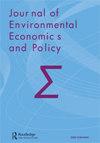离散的和连续的结果度量
IF 1.2
Q3 ENVIRONMENTAL STUDIES
Journal of Environmental Economics and Policy
Pub Date : 2022-11-07
DOI:10.1080/21606544.2022.2142301
引用次数: 1
摘要
如果受访者认为他们的回答可能会影响调查中正在处理的政策,并且如果他们认为如果实施政策,他们将不得不为政策付费,那么他们会发现调查是有后果的。鉴于这些标准,文献遵循两种途径来分析结果性。第一种方法使用离散方法,将受访者分为重要和无关紧要的两组。第二种解释是关于结果性的信念是连续的。我们对这些方法进行比较,以确定它们的优缺点。使用离散方法,我们根据受访者的回答是否满足各种结果性标准将其分类。我们发现,不重要组的受访者的支付意愿与零的差异不显著。对于结果组中的人来说,支付意愿是积极的,并且取决于项目的范围。将结果性视为连续的,并使用混合选择模型,我们发现那些相信自己的反应会影响政策、政策结果性和那些关心舒适的人更有可能支持政策。最后,收入与支付结果呈正相关。本文章由计算机程序翻译,如有差异,请以英文原文为准。
Discrete and continuous measures of consequentiality
ABSTRACT A respondent finds a survey consequential if they believe their answer could influence the policy being addressed in the survey and if they believe that they will have to pay for the policy if implemented. Given these criteria, the literature has followed two paths to analyse consequentiality. The first uses a discrete method that separates respondents into consequential and inconsequential groups. The second interprets beliefs about consequentiality as continuous. We compare these approaches to identify their strengths and weaknesses. Using the discrete approach, we classify respondents into groups based on whether their responses satisfy various consequentiality criteria. We find that respondents in the inconsequential group have a willingness to pay that is insignificantly different from zero. For those in the consequential group, willingness to pay is positive and depends on the scope of the project. Treating consequentiality as continuous and using the hybrid choice model, we find that individuals who believe their responses will influence policy, policy consequentiality, and those who are concerned about the amenity are more likely to be in favour of the policy. Lastly, income is positively related to payment consequentiality.
求助全文
通过发布文献求助,成功后即可免费获取论文全文。
去求助
来源期刊

Journal of Environmental Economics and Policy
ENVIRONMENTAL STUDIES-
CiteScore
4.70
自引率
7.70%
发文量
26
 求助内容:
求助内容: 应助结果提醒方式:
应助结果提醒方式:


